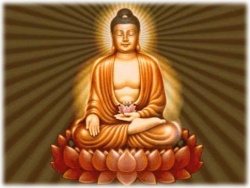Difference between revisions of "Śīlavrata-parāmarśa"
| Line 1: | Line 1: | ||
[[File:Buddha lotus01.jpg|thumb|250px|]] | [[File:Buddha lotus01.jpg|thumb|250px|]] | ||
| − | [[śīlavrata-parāmarśa]] ([[Sanskrit]]; [[Pāli]], [[sīlabbata-parāmāsa]]). [[Obsession with the mechanical performance of rules, rites, and rituals]],false views ,wrong wiews, in the mistaken [[belief]] that such practices in themselves will lead to salvation. This is a [[hindrance]] on the [[religious]] [[path]] and is listed as the third of the ten [[fetters]] ([[saṃyojana]]) and one of the four kinds of [[clinging]] ([[upādāna]]). The [[Buddha]] viewed the sacrificial [[rites]] of the {{Wiki|Brahmins}} as falling into this category and as being inefficacious, like many of the severe austerities practiced by {{Wiki|ascetics}} ([[śramaṇas]]). While raising no objection to wholesome [[rites]] and [[rituals]] and the observance of [[moral]] [[precepts]], he emphasized that these must be supplemented by [[meditative]] practice and the cultivation of [[insight]] and understanding. | + | [[śīlavrata-parāmarśa]] ([[Sanskrit]]; [[Pāli]], [[sīlabbata-parāmāsa]]). [[Obsession with the mechanical performance of rules, rites, and rituals]],[[false views]] ,[[wrong wiews]], in the mistaken [[belief]] that such practices in themselves will lead to salvation. This is a [[hindrance]] on the [[religious]] [[path]] and is listed as the third of the ten [[fetters]] ([[saṃyojana]]) and one of the four kinds of [[clinging]] ([[upādāna]]). The [[Buddha]] viewed the sacrificial [[rites]] of the {{Wiki|Brahmins}} as falling into this category and as being inefficacious, like many of the severe austerities practiced by {{Wiki|ascetics}} ([[śramaṇas]]). While raising no objection to wholesome [[rites]] and [[rituals]] and the observance of [[moral]] [[precepts]], he emphasized that these must be supplemented by [[meditative]] practice and the cultivation of [[insight]] and understanding. |
{{R}} | {{R}} | ||
[http://dictionary.buddhistdoor.com/en/search dictionary.buddhistdoor.com] | [http://dictionary.buddhistdoor.com/en/search dictionary.buddhistdoor.com] | ||
[[Category:Pali terminology]] | [[Category:Pali terminology]] | ||
Revision as of 18:43, 28 July 2013
śīlavrata-parāmarśa (Sanskrit; Pāli, sīlabbata-parāmāsa). Obsession with the mechanical performance of rules, rites, and rituals,false views ,wrong wiews, in the mistaken belief that such practices in themselves will lead to salvation. This is a hindrance on the religious path and is listed as the third of the ten fetters (saṃyojana) and one of the four kinds of clinging (upādāna). The Buddha viewed the sacrificial rites of the Brahmins as falling into this category and as being inefficacious, like many of the severe austerities practiced by ascetics (śramaṇas). While raising no objection to wholesome rites and rituals and the observance of moral precepts, he emphasized that these must be supplemented by meditative practice and the cultivation of insight and understanding.
